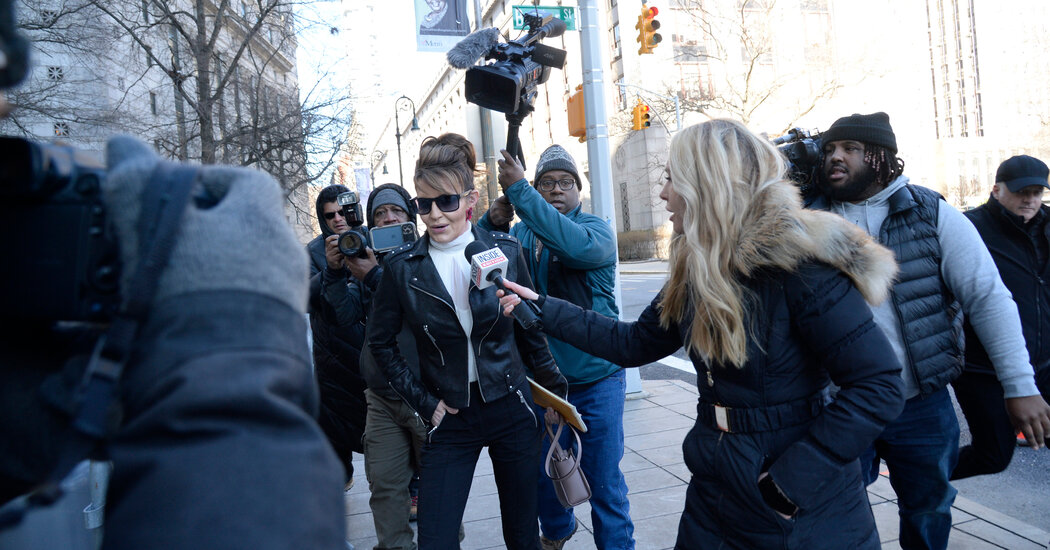A federal judge said Monday that he planned to dismiss Sarah Palin’s libel lawsuit against The New York Times, ruling that her legal team had failed to meet the extremely high legal standard required to prove that the newspaper defamed her when it published a 2017 editorial erroneously linking her to a mass shooting.
The unexpected and unusual decision by the judge, Jed S. Rakoff, came as the jury was still behind closed doors in a Lower Manhattan courthouse deliberating on the case. Judge Rakoff said he would allow the jury to continue working before formally entering his decision, which was in response to a motion from The Times, and that if they ruled in favor of Ms. Palin he would set aside their verdict.
The jury is expected back in the courtroom on Tuesday.
He indicated that he understood his word would not be the last one in the case. Ms. Palin is very likely to appeal. And his decision to allow the jury to continue weighing the evidence was intended to avoid any complications should the case continue moving through the federal courts.
In lengthy comments from the bench, Judge Rakoff said that while he did not believe Ms. Palin’s lawyers had produced enough evidence to prove their defamation claims, he faulted The Times for a series of poor decisions that led to this point.
“This is an example of very unfortunate editorializing on the part of The Times,” he said, adding that he was “hardly surprised” that Ms. Palin brought the suit in the first place. “But having said that, that’s not the issue before this court.”
The case has been viewed as a major test for the First Amendment — rarely do libel suits reach the trial phase — with the potential for far-reaching ramifications for the longstanding precedent that gives journalists breathing room in the law to make mistakes without fear of legal consequence.
Ms. Palin pursued the suit for nearly five years and said on the witness stand that she viewed it as a David-versus-Goliath struggle.
A landmark Supreme Court case, The New York Times Company v. Sullivan, established that a public figure like Ms. Palin has to prove that a news organization acted with “actual malice” in publishing false information, meaning they displayed a reckless disregard for the truth or knew it was false.
Ms. Palin’s lawyers declined to comment after Judge Rakoff announced his decision, as did The Times.
Ms. Palin’s suit alleged that The Times defamed her with an editorial that incorrectly asserted a link between her political rhetoric and a mass shooting near Tucson, Ariz., in 2011 that left six people dead and 14 wounded, including Gabrielle Giffords, then a Democratic member of Congress. Ms. Giffords’s district had been one of 20 singled out on a map circulated by Ms. Palin’s political action committee underneath digitized crosshairs. There was no evidence the shooter had seen or been motivated by the map.
The editorial, which The Times corrected the morning after it was published after readers pointed out the mistake, was published on June 14, 2017. That day, a gunman had opened fire at a baseball field in Virginia where Republican congressmen were practicing, injuring several people including Representative Steve Scalise of Louisiana. The headline was “America’s Lethal Politics,” and the editorial asked whether the Virginia shooting was evidence of how vicious American politics had become.
On the witness stand, the former Times editor who inserted the erroneous wording into the piece, James Bennet, testified that the incident had left him racked with guilt and that he had thought about it almost every day since. “It was just a terrible mistake,” he said.
Ms. Palin and her lawyers attempted to convince the jury that Mr. Bennet had acted out of animus toward her and, regardless of any contrition he later showed, was reckless in rushing to judgment about her.
The Times has not lost a libel case in an American courtroom in at least 50 years.
Legal challenges to press protections have been become more common, and Ms. Palin’s case has been just one of several high-profile lawsuits against journalists to move through the courts in recent years. First Amendment scholars tracking such cases have said that the rise has — not incidentally — coincided with the growing mistrust of mainstream media on the political right and a climate of hostility fostered by former President Donald J. Trump.
In 2019, a Kentucky high school student, Nicholas Sandmann, claimed he was defamed by press reports from The Washington Post, CNN and others depicting his encounter with a Native American man on the National Mall. Those cases were settled. And Devin Nunes, a former Republican member of Congress, is pursuing a case against a reporter now working for Politico who posted to Twitter an article that Mr. Nunes said harmed his family.


























